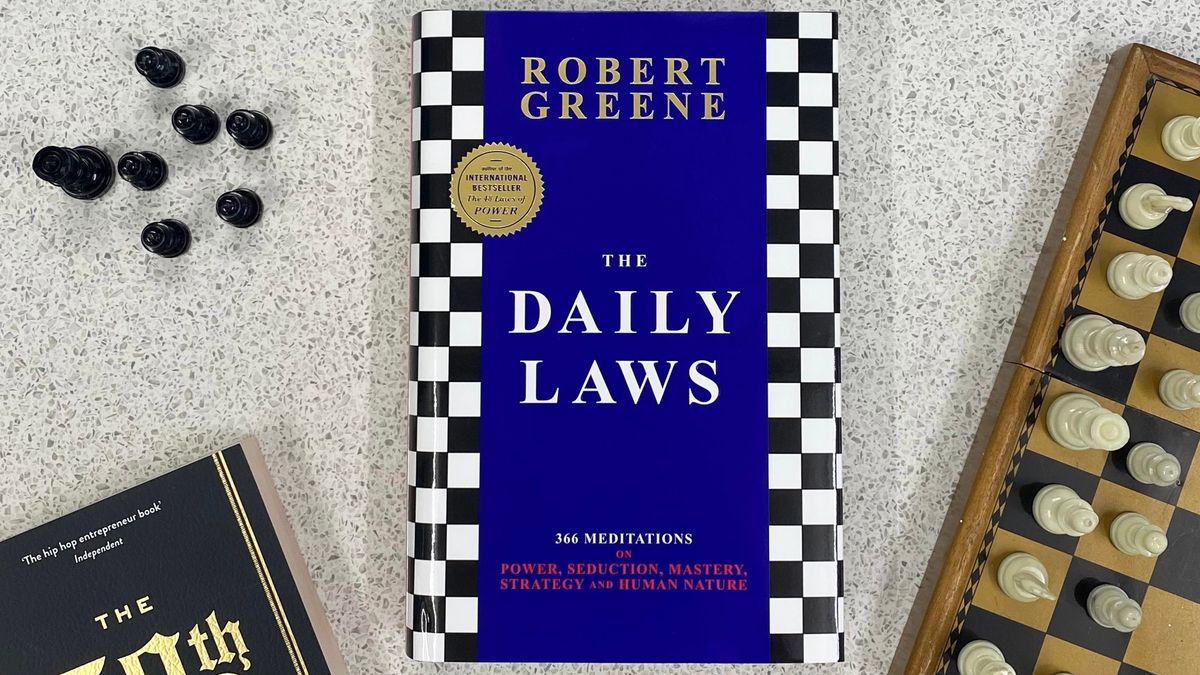The Daily Laws summarizes Greene's work on Mastery, Power, Human Nature, Seduction, Persuasion, Strategy, and the Sublime.
Rating
9/10
One sentence summary
The Daily Laws summarizes Greene's work on Mastery, Power, Human Nature, Seduction, Persuasion, Strategy, and the Sublime.
Mastery
- Read broadly. Read 100 books per year.
- Find your passion. Write down your life mission.
- Develop one skill at a time. Keep training whenever you get time. Put in more hours than the competition to win. Time is the magic ingredient when mastering a skill.
- The only real impediment to success is your emotions — boredom, panic, frustration, insecurity.
- We need to consume motivation and growth mindset content to overcome our emotions.
- Know yourself. Study philosophy, psychology, and neuroscience. Read The School of Life by Alain de Botton. Do meditation, philosophical meditation, and therapy. Write an autobiography.
- Know others. Study human nature, power, and persuasion. Read The Laws of Human Nature, The 48 Laws of Power, and Robert Cialdini.
- Put yourself out there ASAP. Start a blog. Start YouTube. Start a business.
Don’t do things for money, attention, or fame. Do them because you love doing them.
Depression comes from not following your own unique path and making the big decisions of what relationships to have and what vocation to choose.
Your calling is essential. You have a unique contribution that will change the world and help people.
Depending on others is misery. Depending on yourself is power. Develop useful skills and decision-making.
Don’t let others try to tell you about your industry or passion. You are the expert. Mock people who oppose your ideas in your area of expertise. Your unique perspective is what makes you great.
People are visual. They often think that luck or the $1 million deal is what caused the success. But success is really the accumulation of knowledge, skills, improvement in work habits, and the ability to withstand criticism.
Learn as many real-life skills as possible. Learn how to learn. It used to be that only people in a high enough class would be able to go to college and learn what is necessary to become a scientist, for instance. But now we have the internet. You can learn to become anything you want.
See your work through the eyes of others. What parts are not holding up? What are your weak points?
Mingle with as many different types of people as possible. This gives you new ideas and improves your social skills.
Once you master your field, start studying other fields to see if there is another way of looking at it.
Do not rush to finish your project. In the end, the extra months or years you spent will seem worth it. Ex) Adele's album 25. It was supposed to release when she was 25 but it wasn't good enough so she worked on it for 2 more years.
Don’t get complacent. Just because you figured out the answer to a problem doesn’t mean it is still the answer. New research may have come out. Or things may have changed. Or there may be a way for you to improve it.
The best thinkers of the 20th century didn’t know what we know today. They knew nothing about AI. And they didn’t know about the double helix structure of DNA until the mid-1900s. There are huge breakthroughs yet to come that will invalidate what you think is true.
“Do not talk about giftedness, inborn talents! One can name great men of all kinds who were very little gifted. They acquired greatness, became “geniuses”. . . . They allowed themselves time for it.”—Friedrich Nietzsche
Mastery is not a question of genetics or luck, but of following your natural inclinations and the deep desire that stirs you from within. Everyone has such inclinations. This desire within you is not motivated by egotism or sheer ambition for power, both of which are emotions that get in the way of mastery. It is instead a deep expression of something natural, something that marked you at birth as unique. In following your inclinations and moving toward mastery, you make a great contribution to society, enriching it with discoveries and insights, and making the most of the diversity in nature and among human society. It is in fact the height of selfishness to merely consume what others create and to retreat into a shell of limited goals and immediate pleasures. Alienating yourself from your inclinations can only lead to pain and disappointment in the long run, and a sense that you have wasted something unique. This pain will be expressed in bitterness and envy, and you will not recognize the true source of your depression. Your true self does not speak in words or banal phrases. Its voice comes from deep within you, from the substrata of your psyche, from something embedded physically within you. It emanates from your uniqueness, and it communicates through sensations and powerful desires that seem to transcend you. You cannot ultimately understand why you are drawn to certain activities or forms of knowledge. This cannot really be verbalized or explained. It is simply a fact of nature. Daily Law: In following this voice you realize your own potential and satisfy your deepest longings to create and express your uniqueness. It exists for a purpose, and it is your Life’s Task to bring it to fruition.
Power
Ask people with more status or power for advice so that you don’t hurt their ego. Let them take the credit.
Take credit from those below you and then give it to those above you.
Don’t criticize others. Act like other people’s work is great and they will start to do the same for you.
Don’t display anger and emotion. Showing anger does not make you look powerful, it makes people lose respect for you.
Reputation is the cornerstone of power.
Never put too much trust in friends.
Make a cult-like following. Hook people with a compelling cause or new technology.
Keep yourself at a distance. Stay mysterious to increase people’s desire but be charming.
Always flatter people higher than you. Focus on flattering qualities that nobody else has paid attention to.
Be confident (indirectly) demand that others respect you too. Set your prices high to make people think you are worth the price.
If your enemy hates you, eliminate them completely. They will try to hurt you.
Destroy your rivals with rumors.
Emotions and mental states are infectious. Stay away from people with red flags. Avoid the unhappy and the unlucky.
You must develop the skill of being bold. It requires courage.
Ignore problems – canceling, rumors, stories. Never make a public apology.
Periodically, be unpredictable. Switch up the routine. People take routine for granted.
Human Nature
There are 3 types of people:
1. Deniers
- Type 1: These people actually don't manipulate and their career will suffer for it.
- Type 2: These people claim that manipulation is bad but they can be some of the nastiest unconscious manipulators.
2. Manipulators. They thrive on manipulation.
3. The radical realist. The desire for power is part of our nature. You have to play the game to get anything done. We know all the manipulation tricks so that we don't fall for them. We try to play win-win games whenever possible.
Those who make a show or display of innocence are often the least innocent of all.
Dangle the idea of a free lunch.
Machiavelli: People will say anything to make themselves seem moral and good. The only way to judge them accurately is to look at their actions.
Absolute power corrupts absolutely. But Malcolm X said the opposite is also true: Having absolutely no power corrupts absolutely.
Create value through scarcity. If you are already well-known in a group. Have times where you withdraw. Use absence to increase respect and honor.
Your clothes and appearances matter. Take the time to craft a look that conveys the message you want to share.
Play with appearances to see which one is the best.
Never insult someone’s intelligence. Subliminally imply that others are smart.
Tell your rivals that you have goals and ambitions that are not your actual goals. It makes you seem open and trusting while sending them on a wild goose chase.
When leading, make sacrifices yourself to boost the morale of the team. This is like when the Tesla Model 3 was ramping production and Elon slept OUTSIDE his office on the floor of the factory. He slept outside so that the employees could see him. Also, make a few timely criticisms so that they will have a higher standard for quality of work.
Be nice, but make sure that people know you can be downright difficult and nasty. This makes your threats credible. Create a threatening presence.
Be different. Wear the most expensive clothes. Get text messages (sent by yourself) at strange hours. Wear a doctor’s coat. Use a waiter’s pad to take notes.
Always learn new strategies and tactics for winning. Don’t fall back on your previous knowledge.
The truth will make people dislike you. You need to be romantic. Get people excited.
- Never promise a gradual improvement through hard work, rather promise the moon — a great and sudden transformation. Sell a tummy tuck rather than a 6-month weight loss course.
- Play to people’s fantasies. Tell them there are get-rich-quick schemes, magic health pills, and ways to get anyone to date them.
Smart people tell normal people that they believe in the status quo (don’t stir the pot). Only talk about your high ambition with other highly ambitious people.
- Change yourself to fit the values of any group you go into.
The premise of human nature: All of us, to some degree, are in pain. The source of this pain is other people; or rather, interpersonal relationships.
The unhappy and unlucky frame themselves as victims, but their own doing causes their suffering. Do not associate with these people.
All people are driven to power, sex, and relationships. That is why envy is so preeminent. We all envy the person who has more of what we want.
Don’t become overconfident because of success. It will blind you to your flaws.
Depression and anxiety come from not being your complete self—from playing a role.
Emotion is a prerequisite to rationality.
Embody saintliness. Always do what is seen as good and above reproach. Progressive, supremely tolerant, and open-minded. Be seen giving to important causes and supporting them on social media. Project sincerity and honesty. A few public confessions of your weaknesses and vulnerabilities will make you seem honest (they don’t have to be true). Learn how to occasionally appear humble. If dirty work must be done, get others to do it.
Have the belief that you are chosen, destined to do great things. This will make you impervious to haters.
You need to join groups that will make you self-improve—not bring you down.
Study history. Make it a mental exercise to put yourself into the feelings of people who lived them. Empathetic history.
- Everyday Life in Ancient Rome by Lionel Casson
- The Waning of the Middle Ages by Johan Huizinga
- Reading novels from different time periods can give you an even better understanding.
Seduction
People want enchantment, seduction, pleasure, and romantic deception. They love being taken on a surprise journey. Like a kid who loves being picked up and spun around.
You need to find the seductive qualities that you naturally have. If you just follow The Art of Seduction, people will know you’re just following the 24 steps. Switch it up and be unique. And find which steps in the book naturally fit your personality.
Seduction is not about looks, it is about psychology and deception. It applies to marketing and friendships, as well as romantic relationships.
Seduction is a kind of theater in real life. Borderline like you’re two characters in a movie.
Seducers are interested in other people. They do Carl Rogers-style communication where you completely accept the other person and ask them questions about how they feel and how they got to hold their beliefs.
- Don’t think about what you will say. Think about how to get them to go deeper on what they said or listen for something that was implied but not said.
Manufacture popularity. It will make others want to be the one you choose. Surround yourself with people of the opposite sex, friends, former lovers, and present suitors. Create love triangles.
Anti-seducers repel people because they are insecure.
Do surprises: send them a message out of the blue, showing up unexpectedly, taking them to a place they’ve never been. Or, best of all, reveal a new part of your character.
You need to take your target to a concert, a play, or a spiritual encounter. So that they associate something elevated with you.
Mirror a person’s personality. This makes them drop their guard and like you. They will then be open to being influenced by you.
Greed, vanity, and boredom are deep problems that are the root of most of their problems. Find out what it is and tempt them with a solution. If someone has always been adventure-seeking but can’t, temp them with a long trip abroad.
- The clothes, past, past romances, and off-hand comments are big clues as to what can tempt them.
Position yourself as someone from the “outside”, you represent something different, change, a break up of routine. Make them think that their friends are boring and their lives less interesting than they thought.
The key of the seducer is to get the target to feel like a kid. There is no work. How to make your seduction target feel like a kid:
- You plan everything
- You pay for everything
- Board games
- Beach day
- Camping
- Throwback music
- Be spontaneous—surprise them
- Bowling, swimming
- Snow day trip
- Small gifts
- Ice cream, donuts, etc.
- Disney world
Take your target to grand places:
- Big gothic building
- Classical music
- Travel abroad
- Music festival
- Museum
- A skyscraper in a big city
- Haunted house
- Carnival
- Amusement park
Have contrasts in your personality. If you have a sweet face and an innocent body, hint at something dark in your personality.
Persuasion
An author should tell stories before facts to intrigue their readers.
Align other people’s desires with yours. Make it a win-win.
Malcolm X never read from a paper during his speeches. You could feel the anger from years of oppression — this made him charismatic.
Rather than telling people what they do is wrong, do it back to them so they can feel why it is wrong.
Write a book. Books are influential.
Always agree with people on trivial matters. This will make them more likely to agree with you in the future.
Everyone thinks they are more than they currently are. They should be famous painters or social media influencers, but the world is stopping them. Tell them they can be great.
Always be calm and in a good mood. Do not judge others. Accept them as they are. Ask them questions that get at the root of their emotions and feelings. Unconditional love. It is not so much about words but looks and body language.
Strategy
True strategy is giving yourself more options than your opponent.
You have limited time. Do not waste time on trivial things. Do not let people drag you into battles (arguments). Focus on what matters—health, relationships, wealth.
It is always easier to argue from the negative side – To find flaws in an argument. That is why most people opt for this. It takes effort and thought to establish a positive position (make your own argument). The negative makes you look tough and insightful. Force your opponents to commit to some positive position. Then you can poke holes in their argument.
When you start a new project, think first about the tools, connections, etc that could help you. Then plan your strategy around those things. This is more effective than making a strategy and then trying to obtain the means to complete it.
Change your goals as you improve. This allows you to use your new intelligence to create more audacious and free goals.
Sublime
Your time is limited. You could die tomorrow.
The sublime is confronting that you will die.
It is thinking (the lack of meditation) that messes you up when you are going for a golf swing or shooting a basketball (assuming you already have the skill). This is why samurai were obsessed with Zen Buddhism.
The only thing you truly own is your time. But you give it away. You give it away to your boss. You give it away to distractions. Or you can make each moment count. You can spend each moment enriching your life or improving yourself. You can study human nature and business.
Go to a natural place. Don’t bring any tech. Try to survive.
Most people think they know everything they need to know by 30. Do not fall into this trap. Continue to learn forever.
Give yourself deadlines to get your work done.
The false sublime is drugs and alcohol. Or video games or porn. They cause no internal change—all they do is make the person more dependent on the substance. Avoid them.
Look at the sky and stars as if seeing them for the first time.




Comments ()